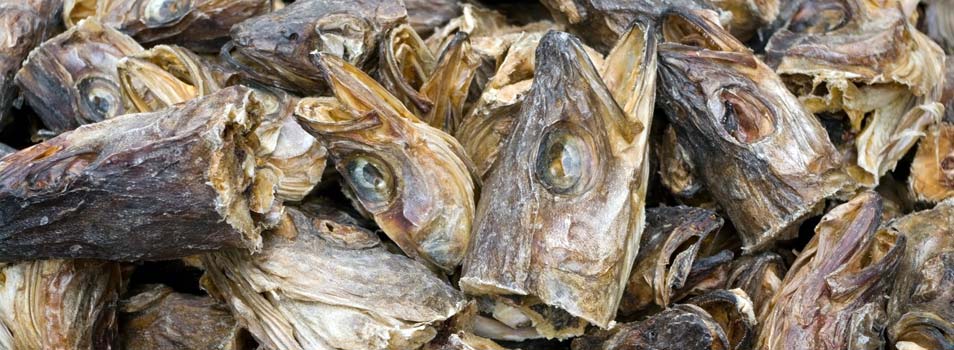Fish: Nutritional benefits
Fish provides a good source of high quality protein for humans and contains many vitamins and minerals. It may be classed as either whitefish, oily or shellfish. White fish, such as haddock and cod, contain very little fat (usually less than 1%) whereas oily fish, such as sardines, contain between 10-25%. The latter, as a result of its high fat content, contain a range of fat-soluble vitamins (A, D, E and K) and essential fatty acids, all of which are vital for the healthy functioning of the body.
Fish is an important source of minerals
Fish is high in minerals such as zinc, iodine and selenium, which keep the body running smoothly. Iodine is essential for the thyroid gland, which controls growth and metabolism, while selenium is used to make enzymes that protect cell walls from cancer-causing free radicals, and helps prevent DNA damage caused by radiation and some chemicals. Fish is also a source of vitamin A, which is needed for healthy skin and eyes, and vitamin D, which is needed to help the body absorb calcium to strengthen teeth and bones.
Oily fish provides Omega 3
Research over the past few decades has shown that the nutrients and minerals in fish, and particularly the omega 3 fatty acids found in pelagic fish, are heart-friendly and can make improvements in brain development and reproduction. This has highlighted the role for fish in the functionality of the human body.
Research background
Doctors have known of strong links between fish and healthy hearts ever since they noticed that fish-eating Inuit populations in the Arctic had low levels of heart disease.
- One study has suggested that adding one portion of fish a week to your diet can cut your chances of suffering a heart attack by half. Fish is thought to protect the heart because eating less saturated fat and more Omega-3 can help to lower the amount of cholesterol and triglycerides in the blood – two fats that, in excess, increase the risk of heart disease.
- Omega 3 fats also have natural built-in anti-oxidants, which are thought to stop the thickening and damaging of artery walls.
Recent studies suggest that older people can boost their brain power by eating more oily fish, with regular consumers being able to remember better and think faster.
- There have also been links suggested between Omega 3 fat DHA and better concentration.
- Separate studies have suggested that older people who eat fish at least once a week could also have a lower chance of developing dementia and Alzheimer's disease.
Including fish as a regular part of a balanced diet has been shown to help the symptoms of rheumatoid arthritis.
- Studies also show that sufferers feel less stiff and sore in the morning if they keep their fish oil intake topped up.
- Recent research has also found a link between Omega-3 fats and a slowing down in the wearing of cartilage that leads to osteoarthritis, opening the door for more research into whether eating more fish could help prevent the disease.
There are around 32,000 species of fish in the world. However, only a small number of species are commonly eaten by humans.
| Common species of fish used for food | |||
|---|---|---|---|
| Mild Flavour | Moderate Flavour | Full Flavour | |
| Delicate Texture | basa, flounder, hake, scup, smelt, rainbow trout, hardshell clam, blue crab,peekytoe crab, spanner crab, cuttlefish, eastern oyster, Pacific oyster | anchovy, herring, lingcod, moi, orange roughy,Atlantic ocean perch, Lake Victoria perch,yellow perch, European oyster, sea urchin | Atlantic mackerelAtlantic mackerel |
| Medium Texture | black sea bass, European sea bass, hybrid striped bass, bream, cod, drum,haddock, hoki, Alaska pollock, rockfish, pink salmon, snapper, tilapia, turbot, walleye, lake whitefish, wolffish, hardshell clam, surf clam, cockle, Jonah crab, snow crab, crayfish, bay scallop, Chinese white shrimp | sablefish, Atlantic salmon, coho salmon, skate, dungeness crab, king crab, blue mussel, greenshell mussel, pink shrimp | escolar, chinook salmon, chum salmon, American shad |
| Firm Texture | arctic char, carp, catfish, dory, grouper, halibut, monkfish, pompano, Dover sole,sturgeon, tilefish, wahoo, yellowtail, Abalone, conch, stone crab, American lobster, spiny lobster, octopus, black tiger shrimp, freshwater shrimp, gulf shrimp, Pacific white shrimp, squid | barramundi, cusk, dogfish, kingklip, mahimahi, opah, mako shark, swordfish, albacore tuna, yellowfin tuna, geoduck clam, squat lobster, sea scallop, rock shrimp | barracuda, Chilean sea bass, cobia, croaker, eel, blue marlin, mullet, sockeye salmon, bluefin tuna |
We have been working with Mapco since its formation and have only positive things to say about the ethos of the company, and thoroughly believe the company will go from strength to strength.”
 The vision for Mapco Group is to be more than a successful trading business. The Group have just established the Mapco Foundation, a charitabl Full Story...
The vision for Mapco Group is to be more than a successful trading business. The Group have just established the Mapco Foundation, a charitabl Full Story...
Mapco Group have recently launched the Africa Incubator Fund, and are actively researching areas for ethical investment opportunities on the Africa Full Story...








